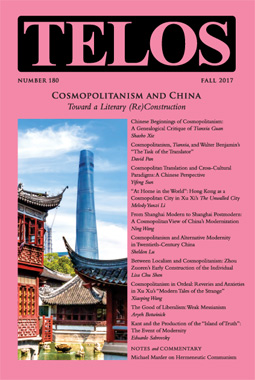Telos 180 (Fall 2017) is now available for purchase in our store.
 In Western as well as international academia today, along with the acceleration of globalization more generally, humanities scholars have constructed a sort of theoretical discourse of globalization. In doing so, they have found it useful to refer to the old-fashioned philosophical concept of cosmopolitanism, which is very close to the theoretical construction of the discourse of globalization. Although it has previously been discussed over the history of Western philosophy, cosmopolitanism is once again a cutting-edge theoretical topic. The term nowadays frequently appears in the works of political philosophers and sociologists, and it is increasingly being taken up and debated by literary and cultural studies scholars as well, particularly with regard to the rise of world literature as the highest phase of comparative literature. Obviously, most of their work interprets and deals with cosmopolitanism from the perspectives of political philosophy and culture, while touching to some degree upon literary and cultural production and criticism. Moreover, most of the scholarship dealing with cosmopolitanism only occurs within a Western context. In this respect, the present special issue of Telos may well fill a gap in international cosmopolitanism scholarship. The recent interest in world literature in the field of comparative literature is undoubtedly associated with the rise of cosmopolitanism in the contemporary era. In the articles collected here, cosmopolitanism will mainly be addressed from literary and cultural perspectives, and, more importantly, they will move beyond the limits of Eurocentric or West-centric ways of thinking and modes of research by dealing exclusively with cosmopolitanism and China: its parallel relations with ancient Chinese philosophy, its impact on modern Chinese literature and intellectual thought, and its recent significance to China’s modernization and globalization.
In Western as well as international academia today, along with the acceleration of globalization more generally, humanities scholars have constructed a sort of theoretical discourse of globalization. In doing so, they have found it useful to refer to the old-fashioned philosophical concept of cosmopolitanism, which is very close to the theoretical construction of the discourse of globalization. Although it has previously been discussed over the history of Western philosophy, cosmopolitanism is once again a cutting-edge theoretical topic. The term nowadays frequently appears in the works of political philosophers and sociologists, and it is increasingly being taken up and debated by literary and cultural studies scholars as well, particularly with regard to the rise of world literature as the highest phase of comparative literature. Obviously, most of their work interprets and deals with cosmopolitanism from the perspectives of political philosophy and culture, while touching to some degree upon literary and cultural production and criticism. Moreover, most of the scholarship dealing with cosmopolitanism only occurs within a Western context. In this respect, the present special issue of Telos may well fill a gap in international cosmopolitanism scholarship. The recent interest in world literature in the field of comparative literature is undoubtedly associated with the rise of cosmopolitanism in the contemporary era. In the articles collected here, cosmopolitanism will mainly be addressed from literary and cultural perspectives, and, more importantly, they will move beyond the limits of Eurocentric or West-centric ways of thinking and modes of research by dealing exclusively with cosmopolitanism and China: its parallel relations with ancient Chinese philosophy, its impact on modern Chinese literature and intellectual thought, and its recent significance to China’s modernization and globalization.


